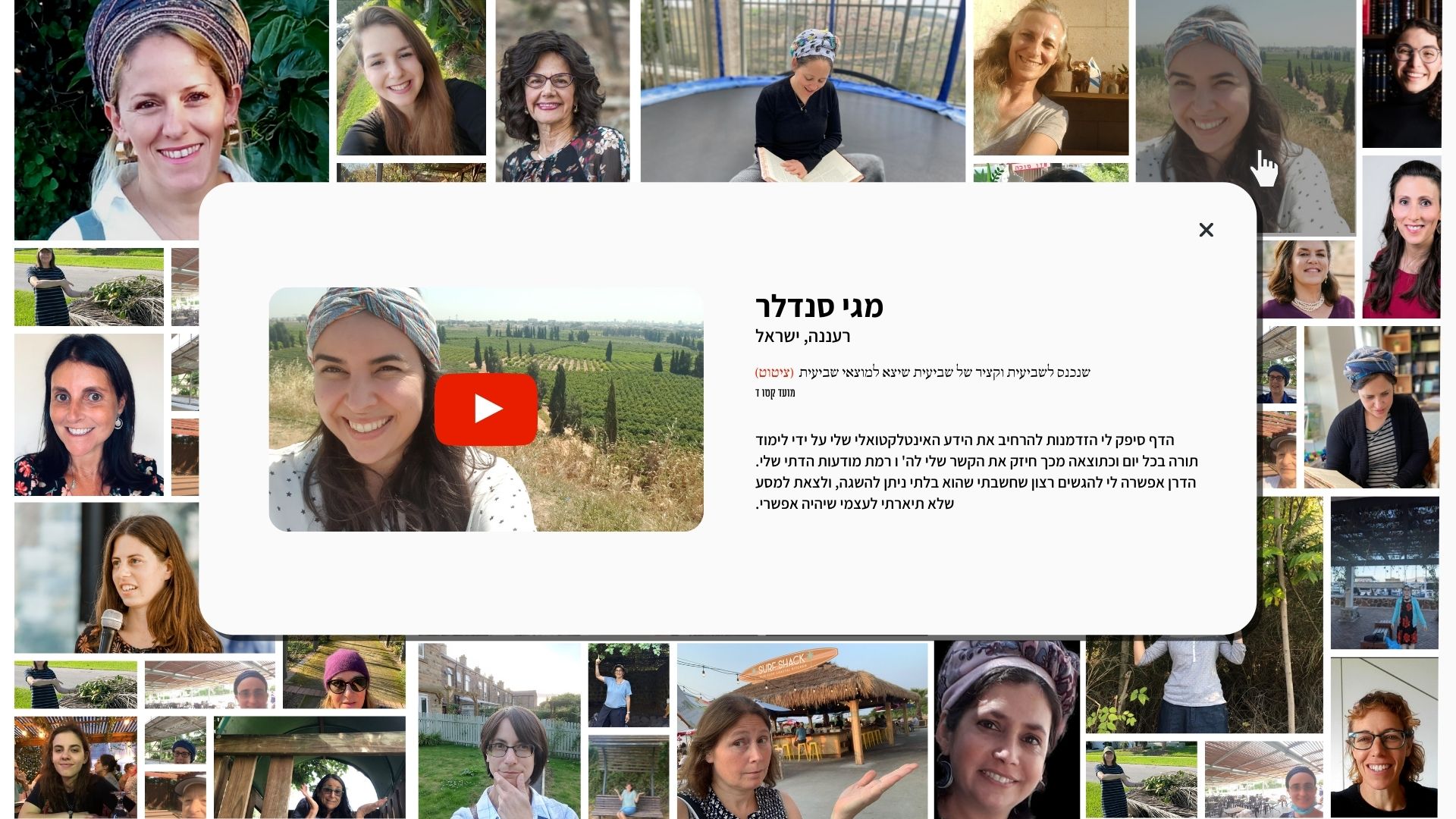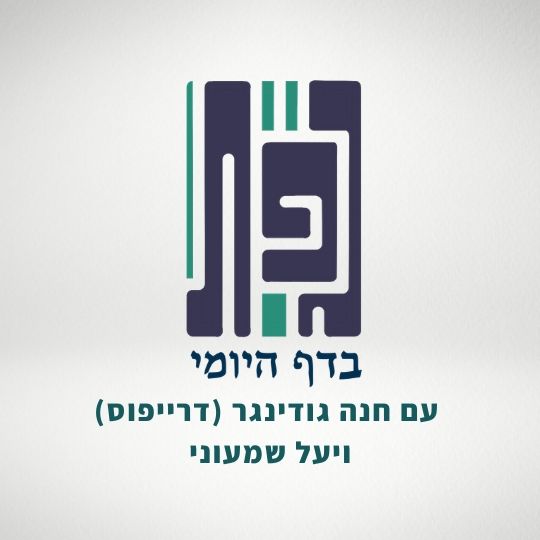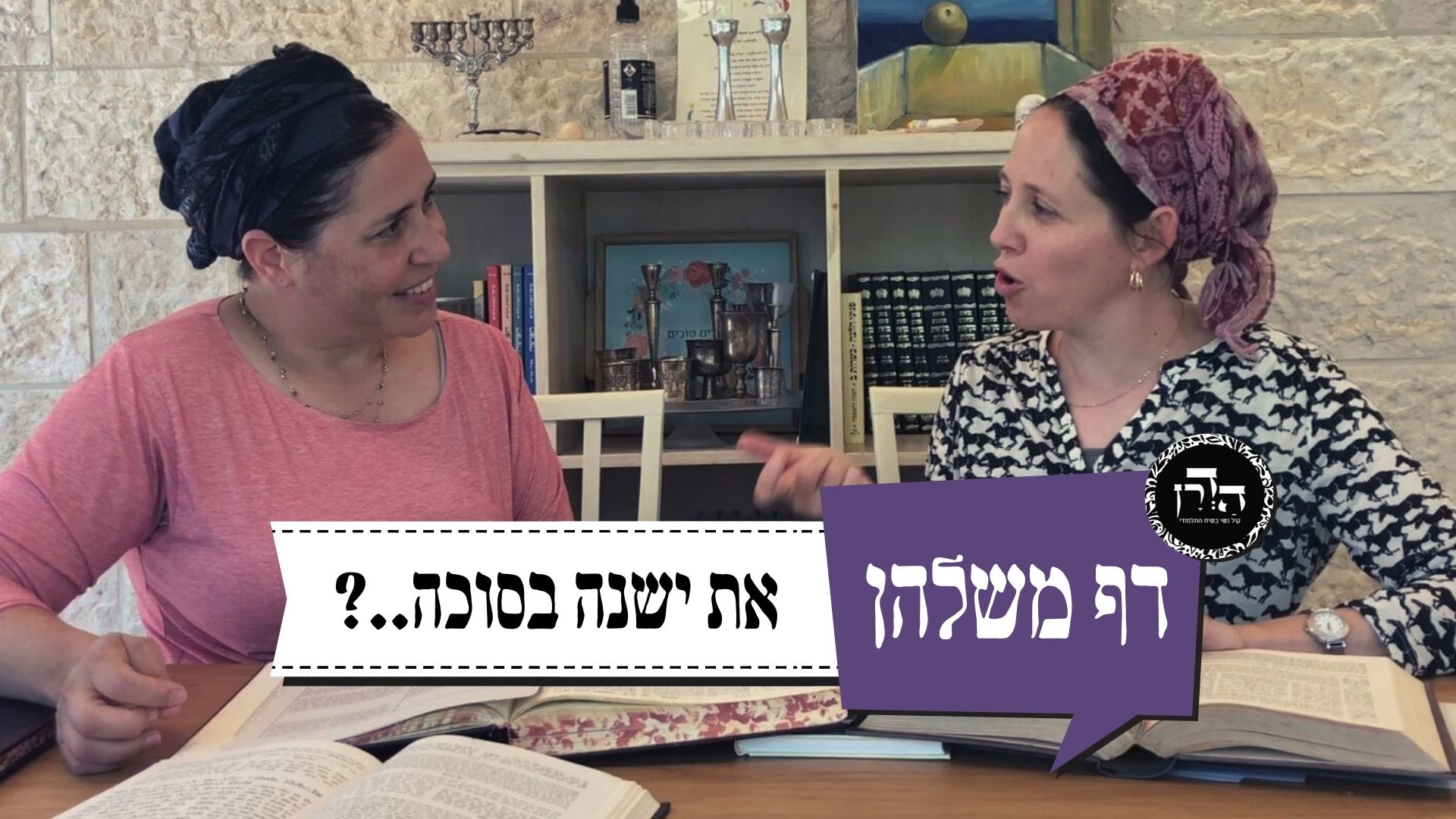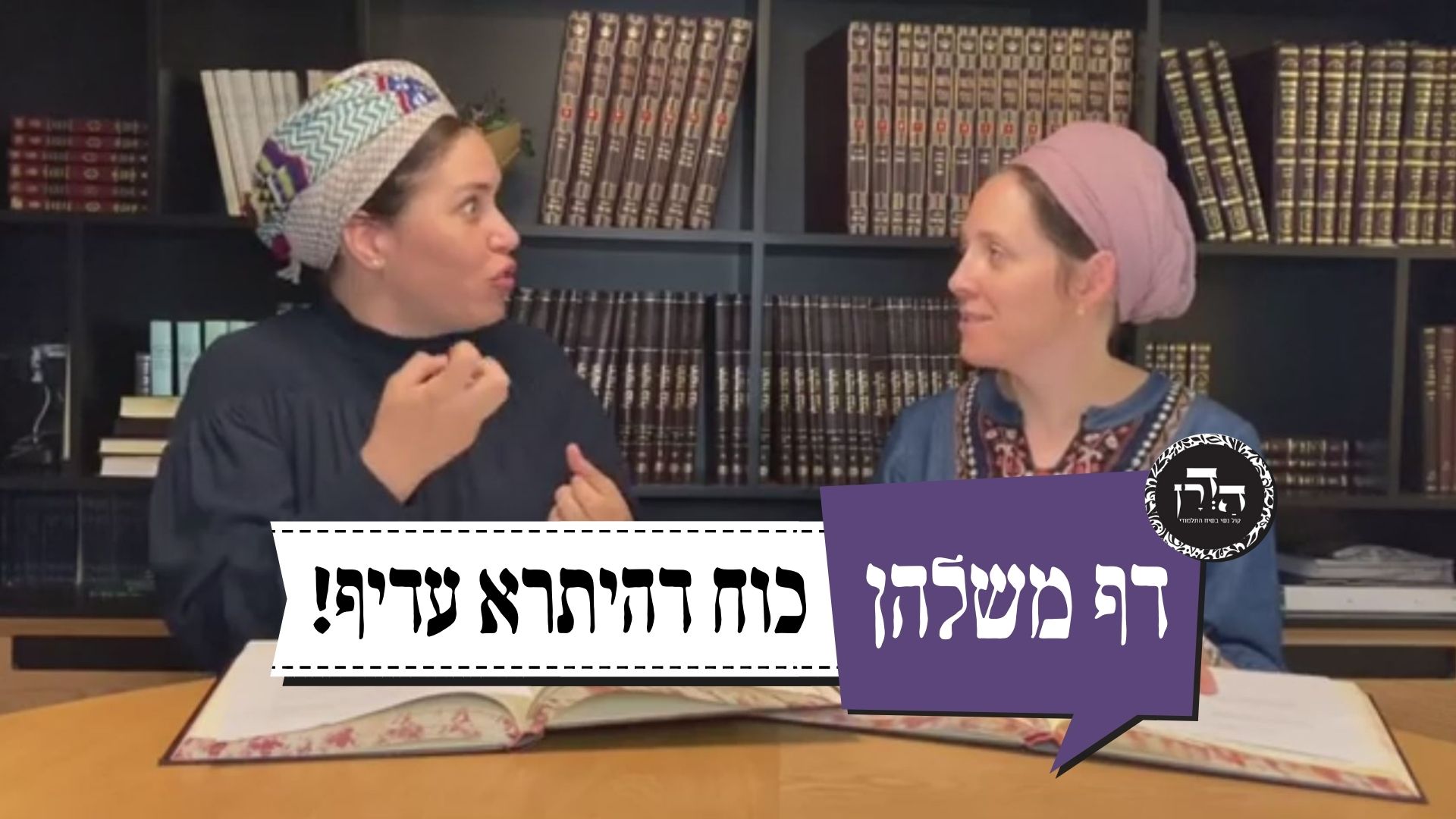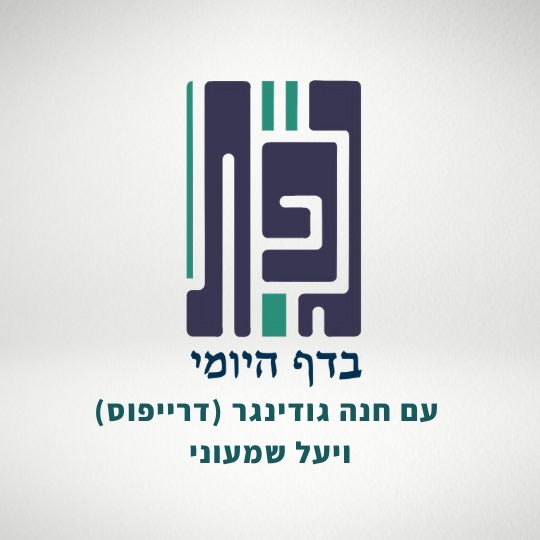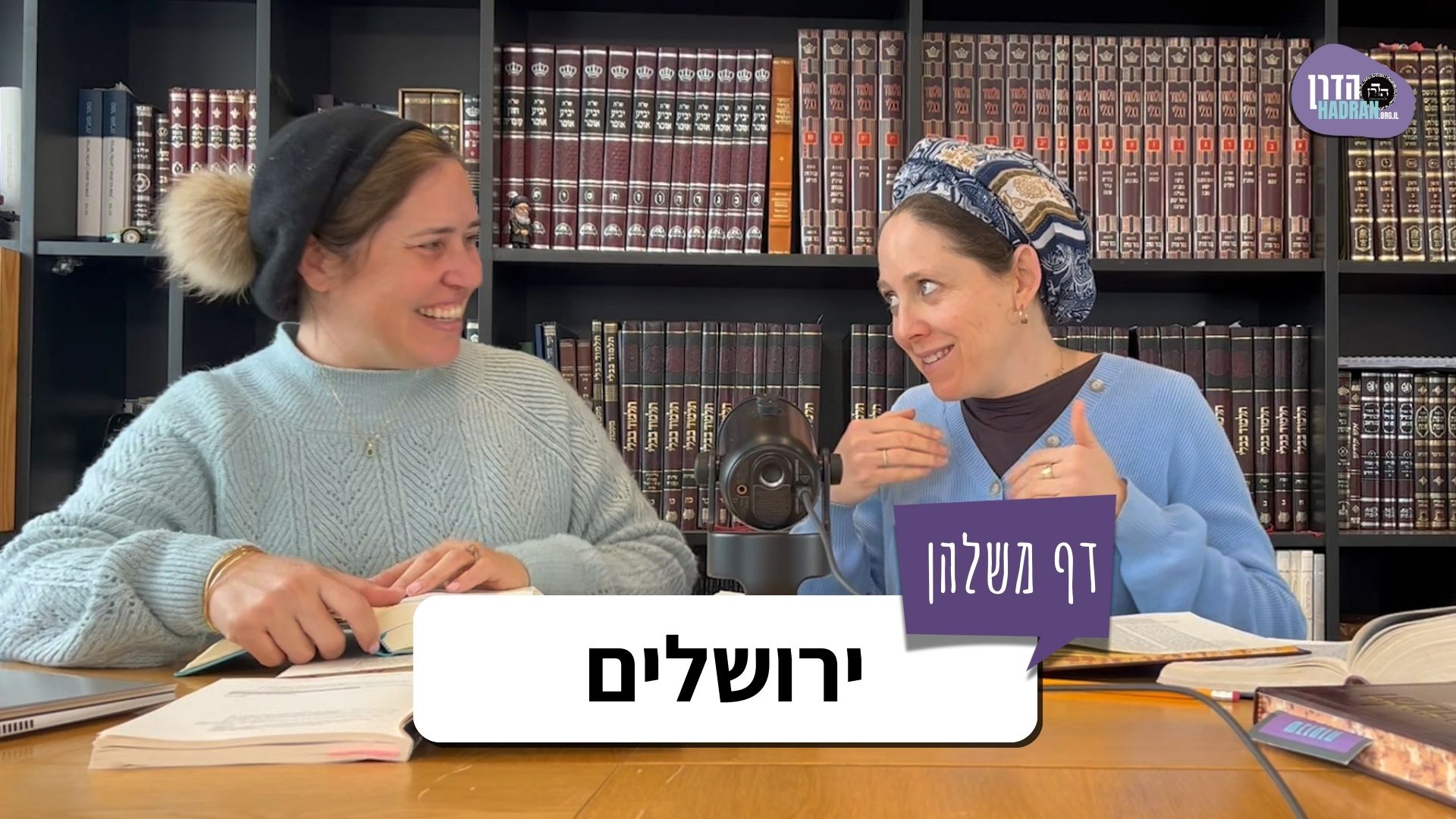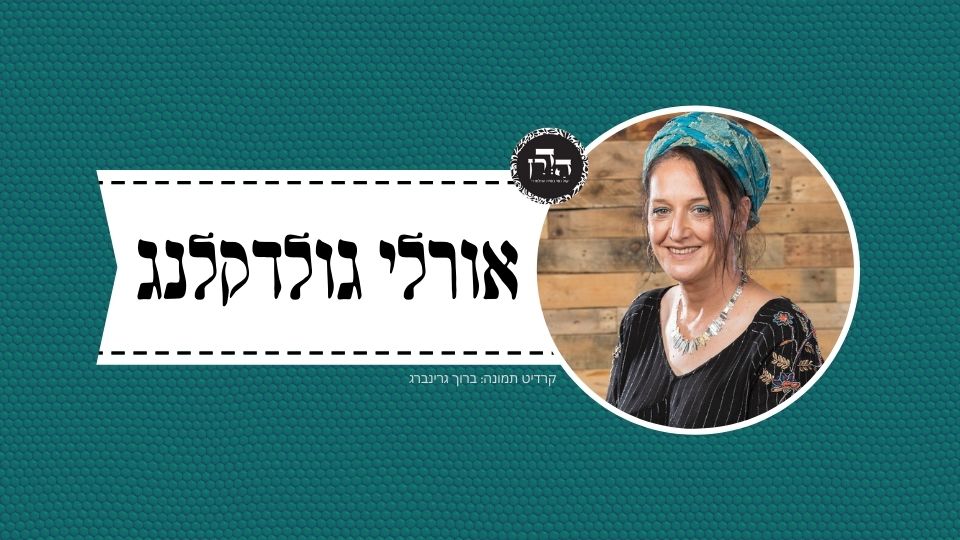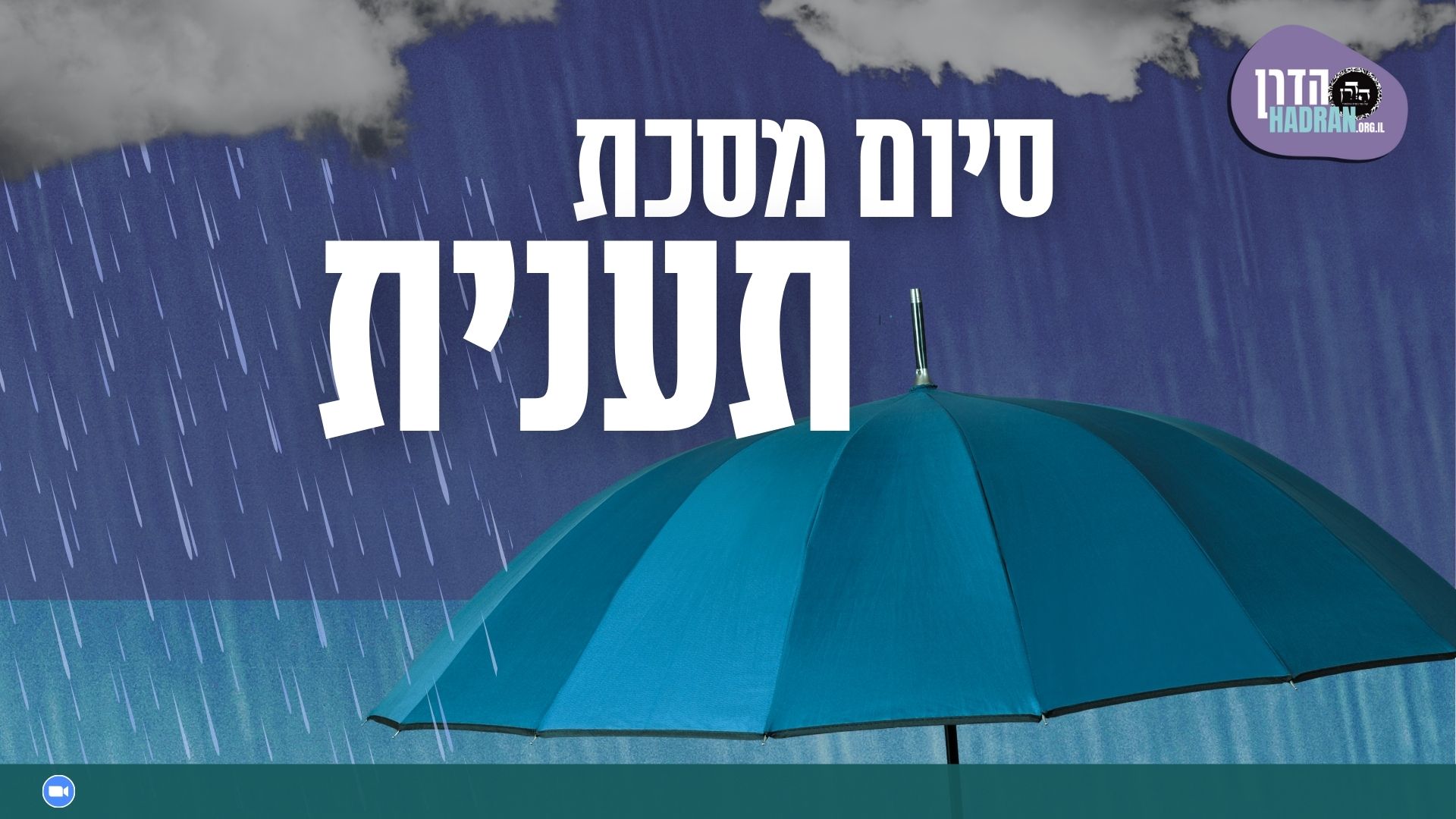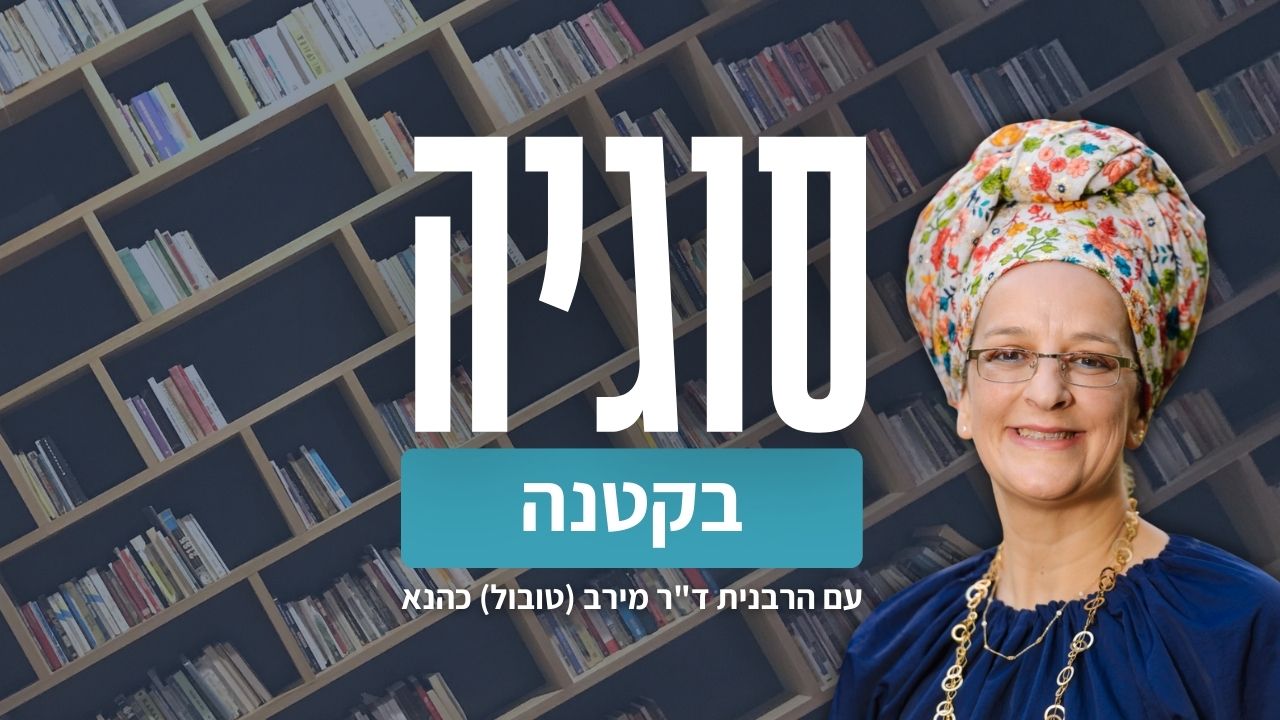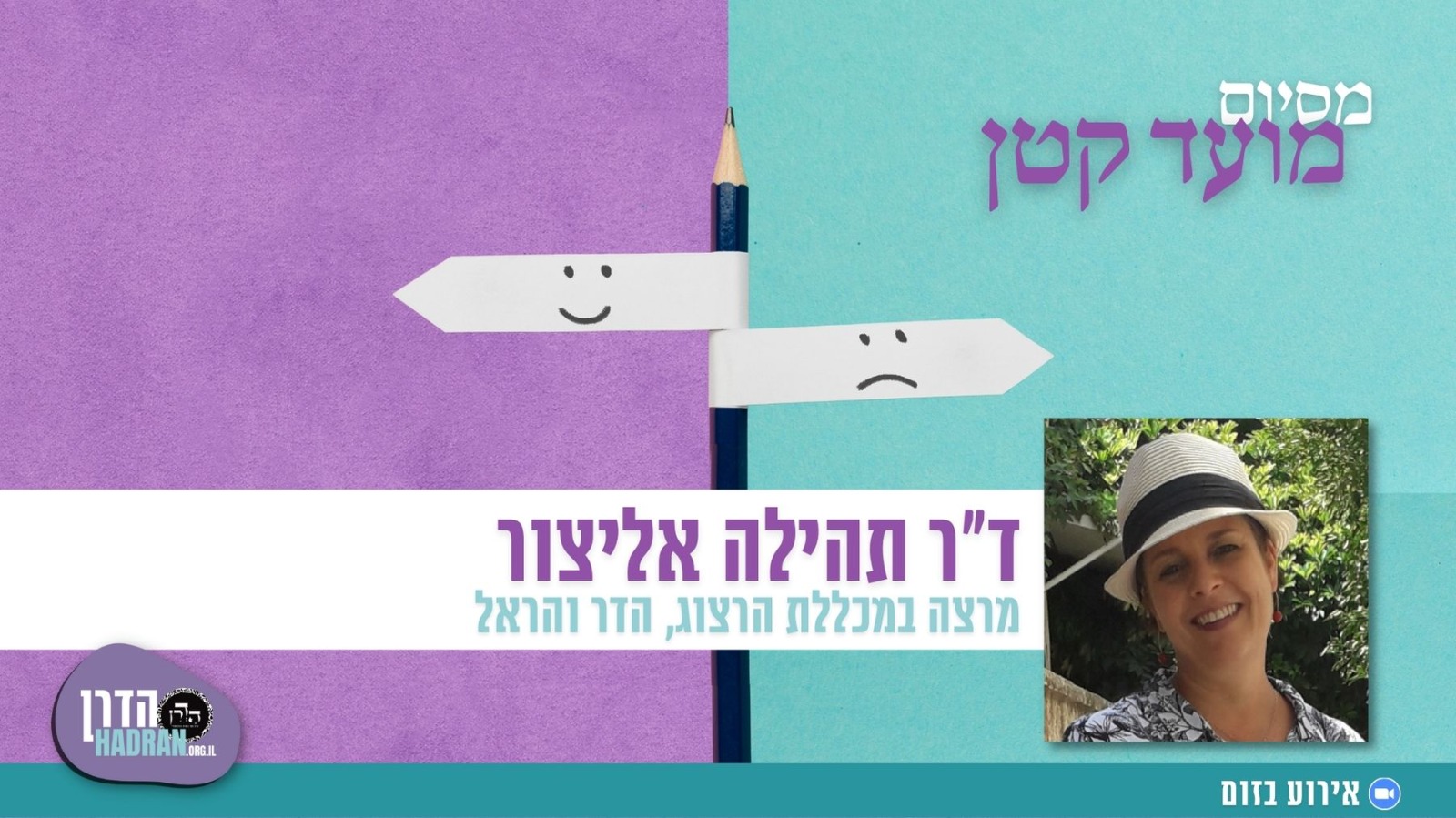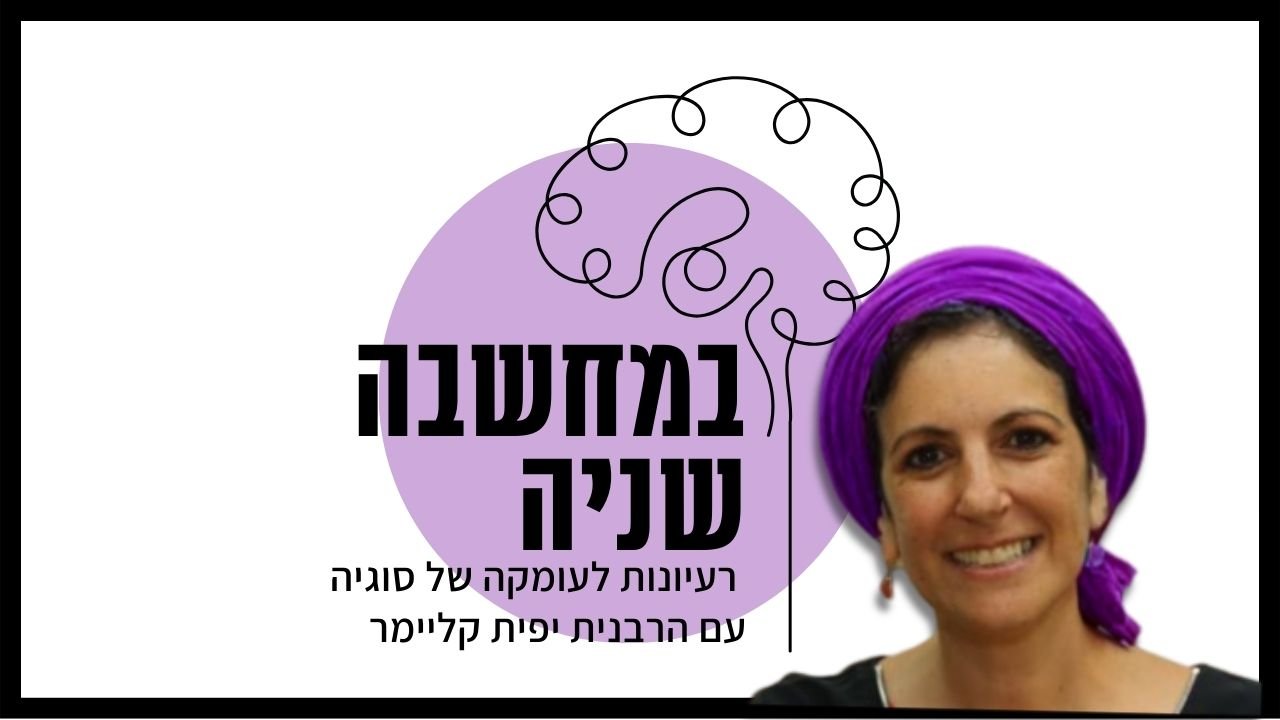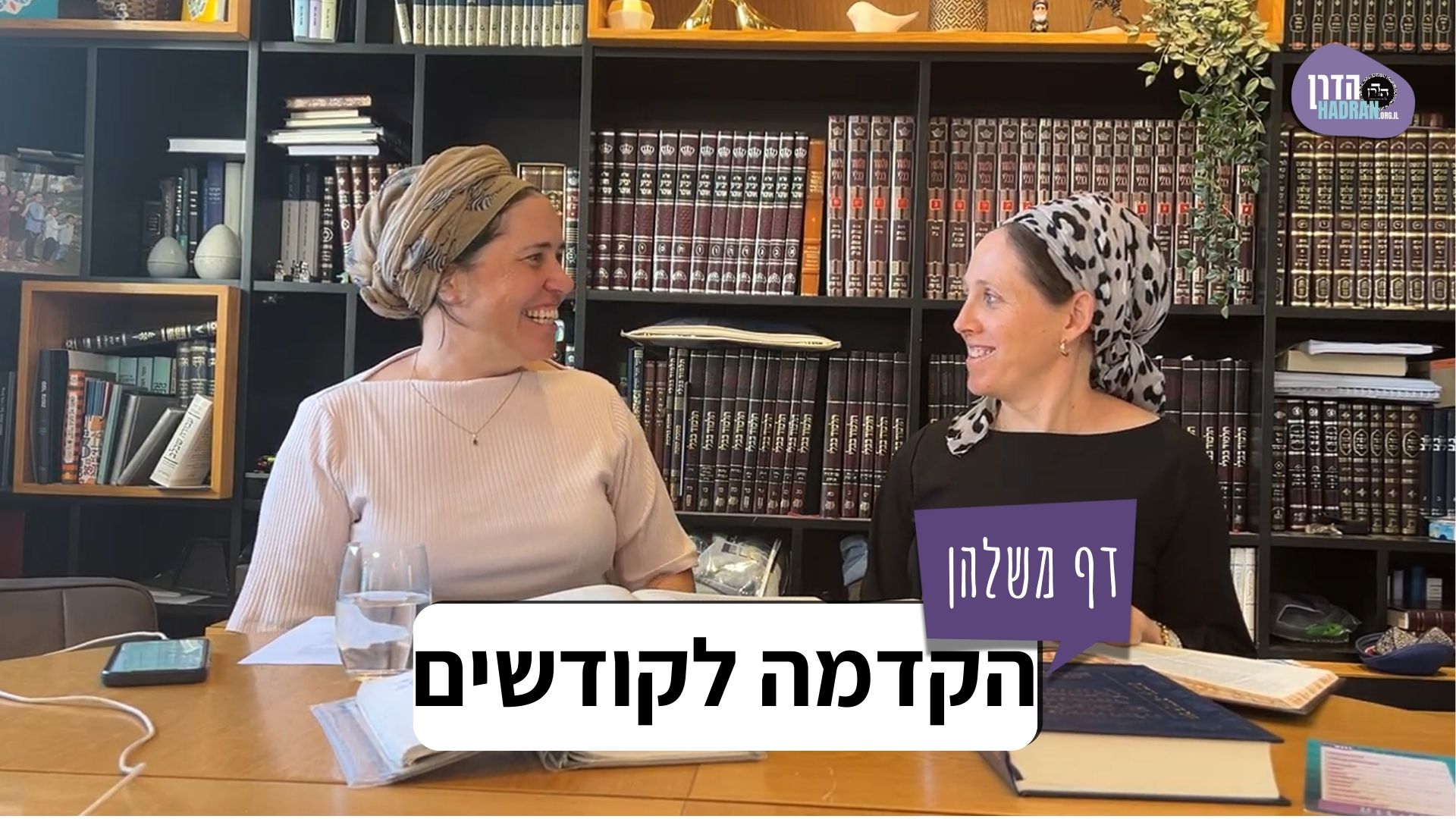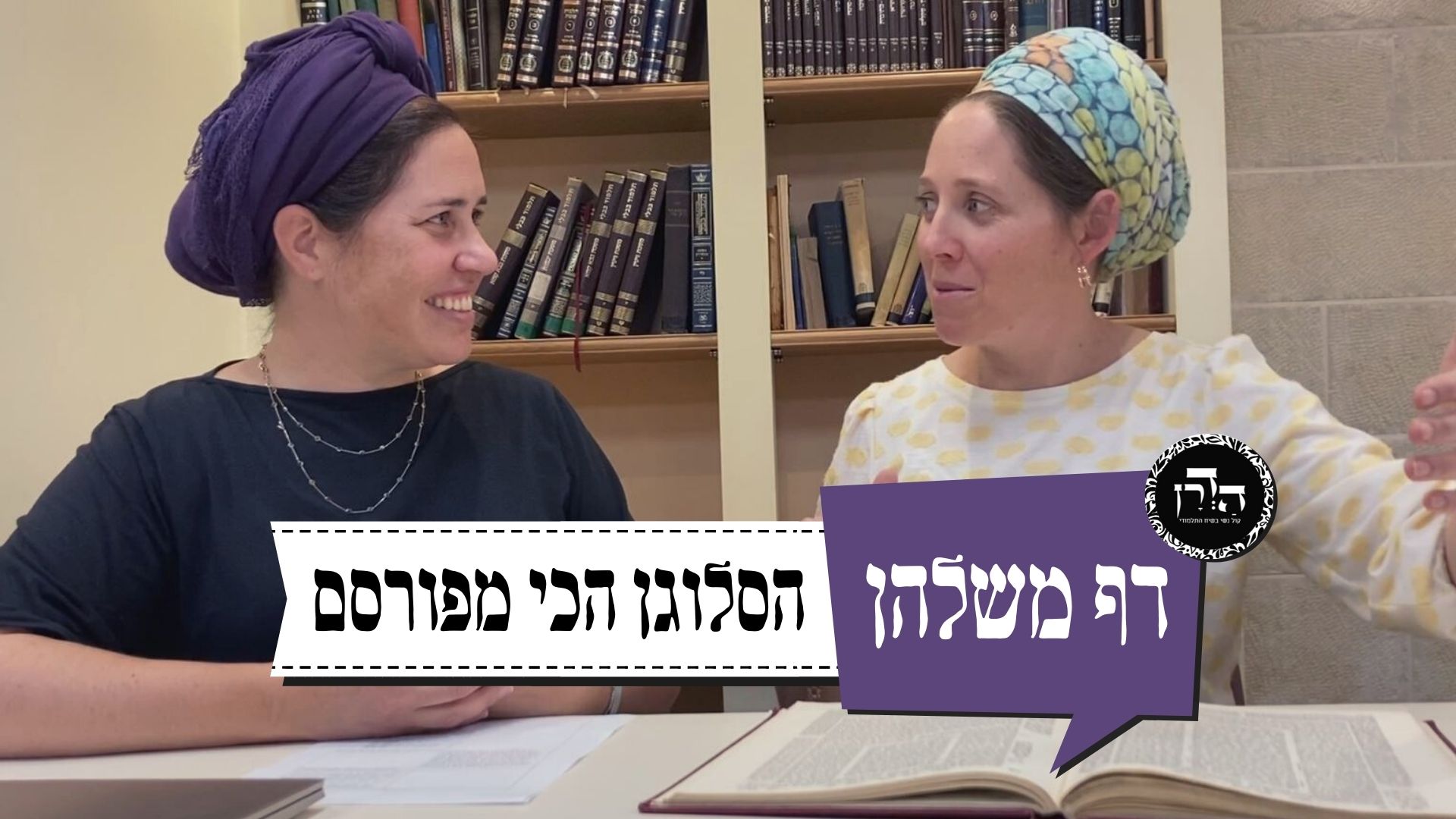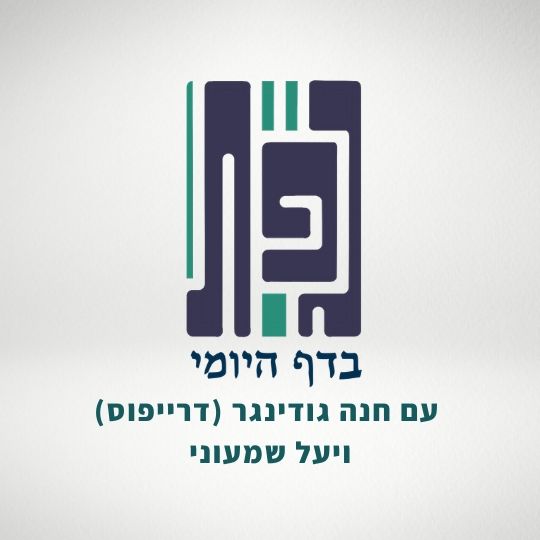מחלוקת ר’ זירא ורבא לגבי החשיבות של ספק ידיעה גם מופיע כמחלוקת ר’ יוחנן וריש לקיש. הגמרא מביאה ברייתא שסותרת שיטותיהם – איך היא פוטרת את הבעייה? העובר על עבירה בשוגג אבל לא יודע על איזה עבירה עבר – מה הדין – האם מביאים חטאת? אשם תלוי? או לא כלום? האם המקרה הזה רק כשיש שני שמות נפרדות לעבירה או גם בתוך אותה עבירה? מה זה מתעסק? ואיך ההלכה של מתעסק משתנה בסוגים שונים של עבירות כמו שבת, אכילת חלב ועבירות אחרות? מי שיש לפניו שני ילדים לימול בשבת ועשה ברית מילה לשזה שלא חייב בשבת – פטור משום שהיה עסוק במצווה. למה לא פטור משום מתעסק אפילו אם לא היה עסוק במצווה?
רוצה להקדיש שיעור?
כלים
העמקה
רוצה להבין מה באמת קורה מתחת לפני השטח של הסוגיה?
שיעורים, פודקאסטים והרחבות של מיטב המורות שלנו יפתחו לך עוד זוויות וכיווני חשיבה.
חדשה בלימוד הגמרא?
זה הדף הראשון שלך? איזו התרגשות עצומה! יש לנו בדיוק את התכנים והכלים שיעזרו לך לעשות את הצעדים הראשונים ללמידה בקצב וברמה שלך, כך תוכלי להרגיש בנוח גם בתוך הסוגיות המורכבות ומאתגרות.
פסיפס הלומדות שלנו
גלי את קהילת הלומדות שלנו, מגוון נשים, רקעים וסיפורים. כולן חלק מתנועה ומסע מרגש ועוצמתי.
כריתות יט
רַבִּי שִׁמְעוֹן פּוֹטֵר בָּזוֹ. רַבִּי שִׁמְעוֹן בֶּן יְהוּדָה פּוֹטֵר בְּכוּלָּן מִשּׁוּם רַבִּי שִׁמְעוֹן.
The baraita continues by citing a dispute concerning Rabbi Shimon’s opinion. Rabbi Shimon exempts him from the obligation to bring an offering in this particular case. Since he became pure in between, at no point did he have definite knowledge that he was impure. For one to be liable to bring an offering for entering the Temple in a state of ritual impurity he must have knowledge of the impurity at the beginning and the end, and a lack of knowledge in the middle. Rabbi Shimon ben Yehuda deems him exempt from the obligation to bring an offering in all of those cases, and he reports this opinion in the name of Rabbi Shimon.
וַאֲפִילּוּ בְּקַמַּיְיתָא? אָמַר רָבָא: הָכָא בְמַאי עָסְקִינַן? כְּגוֹן שֶׁהָלַךְ בָּרִאשׁוֹן וּבִשְׁעַת הִילּוּכוֹ בַּשֵּׁנִי שָׁכַח שֶׁהָלַךְ בָּרִאשׁוֹן, וּבְהָא פְּלִיגִי, תַּנָּא קַמָּא סָבַר: מִקְצָת יְדִיעָה כִּידִיעָה דָּמְיָא, וְרַבִּי שִׁמְעוֹן סָבַר: מִקְצָת יְדִיעָה לָאו כִּידִיעָה דָּמְיָא.
Before explaining the contradictions between the opinions of Rabbi Yoḥanan and Reish Lakish, the Gemara asks a question about Rabbi Shimon ben Yehuda’s statement: Can it be that Rabbi Shimon holds that one is exempt even in the first case? Since he walked down both paths prior to entering the Temple, he had definite knowledge of his impure status. Rava said: What are we dealing with here? We are dealing with a case where he walked on the first path, and at the time of his walking on the second path he forgot that he had previously walked on the first path. Consequently, the knowledge that would render him liable to bring a sin offering is incomplete. And it is with regard to this point that they disagree: The first tanna holds that partial knowledge is considered like full knowledge, and Rabbi Shimon holds that partial knowledge is not considered like full knowledge.
אָמַר מָר: הָלַךְ בָּרִאשׁוֹן וְנִכְנַס, וְהִיזָּה וְטָבַל, וְהָלַךְ בַּשֵּׁנִי וְנִכְנַס – חַיָּיב. אַמַּאי חַיָּיב? הָא לָא הֲוַי לֵיהּ יְדִיעָה!
The Gemara returns to discuss the contradictions for which it cited this baraita. The Master said: If he walked on the first path and entered the Temple, and then he received the sprinkling of the ashes of the red heifer on the third and seventh days, and immersed, and subsequently walked on the second path and entered the Temple, he is liable to bring a sin offering. The Gemara asks: Why is he liable? After all, he did not have definite knowledge of his ritual impurity each time he entered the Temple. Although it is certain that after walking on the second path he had contracted ritual impurity at some point, as he had been purified in between, there was no specific point at which he had knowledge of definite impurity.
אָמַר רֵישׁ לָקִישׁ: הָא מַנִּי – רַבִּי יִשְׁמָעֵאל הִיא, דְּלָא בָּעֵי יְדִיעָה בַּתְּחִלָּה. רַבִּי יוֹחָנָן אָמַר: אֲפִילּוּ תֵּימָא רַבָּנַן, כָּאן עָשׂוּ סְפֵק יְדִיעָה כִּידִיעָה.
Reish Lakish said: In accordance with whose opinion is this baraita? It is in accordance with the opinion of Rabbi Yishmael, who does not require knowledge at the outset, before an unwitting transgression, in order to render one liable to bring a sin offering. Rabbi Yoḥanan said: You may even say that it is in accordance with the opinion of the Rabbis, who maintain that definite knowledge is necessary to render one liable to bring a sin offering, as here they rendered uncertain knowledge like full knowledge.
סָלְקָא דַעְתָּךְ: כָּאן עָשׂוּ, וְהוּא הַדִּין לְכׇל הַתּוֹרָה כּוּלָּהּ, קַשְׁיָא דְּרַבִּי יוֹחָנָן אַדְּרַבִּי יוֹחָנָן.
The Gemara explains the contradiction: It enters your mind to say that Rabbi Yoḥanan meant that here they rendered uncertain knowledge like full knowledge, and the same is true for the entire Torah. Therefore, it is difficult, as there is an apparent contradiction between the statement of Rabbi Yoḥanan above and this statement of Rabbi Yoḥanan. Here, Rabbi Yoḥanan says that uncertain knowledge is considered like full knowledge, whereas earlier he stated that uncertain knowledge, unlike full knowledge, does not divide separate unwitting transgressions to render one obligated to bring multiple sin offerings.
קַשְׁיָא דְּרֵישׁ לָקִישׁ אַדְּרֵישׁ לָקִישׁ.
And likewise it is difficult with regard to the apparent contradiction between the statement of Reish Lakish earlier and the statement of Reish Lakish here. Reish Lakish previously stated that Rabbi Yehuda HaNasi maintains that uncertain knowledge divides unwitting transgressions to render one obligated to bring separate sin offerings, whereas here he explains that the baraita is in accordance with the opinion of Rabbi Yishmael, not Rabbi Yehuda HaNasi.
בִּשְׁלָמָא דְּרַבִּי יוֹחָנָן אַדְּרַבִּי יוֹחָנָן לָא קַשְׁיָא: כָּאן עָשׂוּ, אֲבָל בְּכׇל הַתּוֹרָה כּוּלָּהּ – לָא,
The Gemara comments: Granted, the apparent contradiction between one statement of Rabbi Yoḥanan and the other statement of Rabbi Yoḥanan is not difficult. One can answer that when he said: Here they rendered uncertain knowledge like full knowledge, he meant specifically here, but with regard to the entire Torah it is not considered like full knowledge.
מַאי טַעְמָא? הָכָא, גַּבֵּי טוּמְאָה כְּתִיב: ״וְנֶעְלַם מִמֶּנּוּ וְהוּא טָמֵא״ – יְדִיעָה דְּאִית בַּהּ נָמֵי סָפֵק חַיָּיב קְרָא, אֲבָל בְּכׇל הַתּוֹרָה כּוּלָּהּ כְּתִיב: ״אוֹ הוֹדַע אֵלָיו חַטָּאתוֹ״ – אִי אִית לֵיהּ יְדִיעָה הוּא דְּמִחַיַּיב.
The Gemara asks: What is the reason that this particular case is an exception? Here, with regard to ritual impurity, it is written: “Or if anyone touch any impure thing…and it was concealed from him that he is impure” (Leviticus 5:2). This indicates that even when one has knowledge that has an uncertainty to it, the verse renders him obligated to bring an offering. But with regard to the rest of the entire Torah it is written: “If his sin, which he has sinned, be known to him” (Leviticus 4:28). This teaches that it is only if he has full knowledge that he is obligated to bring an offering.
אֶלָּא לְרֵישׁ לָקִישׁ קַשְׁיָא, אַדְּמוֹקֵים לַהּ כְּרַבִּי יִשְׁמָעֵאל, לוֹקְמַהּ כְּרַבִּי! הָא קָא מַשְׁמַע לַן דְּרַבִּי יִשְׁמָעֵאל נָמֵי לָא בָּעֵי יְדִיעָה בַּתְּחִלָּה.
But the contradiction between one statement of Reish Lakish and the other statement of Reish Lakish is difficult: Instead of interpreting the baraita in accordance with the opinion of Rabbi Yishmael, he should interpret it in accordance with the opinion of Rabbi Yehuda HaNasi. The Gemara answers: This is what Reish Lakish is teaching us by establishing the baraita in accordance with Rabbi Yishmael: That Rabbi Yishmael also does not require knowledge at the outset, before an unwitting transgression, in order to render one liable to bring a sin offering.
הָא מַתְנִיתִין הִיא! דִּתְנַן, רַבִּי יִשְׁמָעֵאל אוֹמֵר: ״וְנֶעְלַם מִמֶּנּוּ״ שְׁתֵּי פְּעָמִים – לְחַיֵּיב עַל הֶעְלֵם טוּמְאָה וְעַל הֶעְלֵם מִקְדָּשׁ!
The Gemara objects: But that is already taught explicitly in a mishna, as we learned (Shevuot 14b) that Rabbi Yishmael says: The verse states: “It was concealed from him” (Leviticus 5:2–3), twice. One mention of the phrase serves to render one obligated to bring a sin offering for a lapse of awareness of his state of ritual impurity when he entered the Temple, and the other mention of the phrase teaches that he is obligated to bring a sin offering for a lapse of awareness during which he forgot that the building he was entering while impure was the Temple. Since this is the same verse that is the source for the requirement of knowledge at the outset, evidently Rabbi Yishmael disagrees with this opinion, as he derives a different halakha from the verse.
אִיצְטְרִיךְ, סָלְקָא דַעְתָּךְ אֲמִינָא: מִקְרָא לֵית לֵיהּ, מִגְּמָרָא אִית לֵיהּ, קָא מַשְׁמַע לַן.
The Gemara explains: It was necessary for Reish Lakish to state that Rabbi Yishmael does not require knowledge at the outset, as it might enter your mind to say: Although Rabbi Yishmael has no verse from which he could derive this requirement, perhaps he has a tradition with regard to the requirement of prior knowledge. By establishing that the baraita is in accordance with the opinion of Rabbi Yishmael, Reish Lakish teaches us conclusively that Rabbi Yishmael does not require knowledge at the outset.
מַתְנִי׳ חֵלֶב וְנוֹתָר לְפָנָיו, וְאָכַל אֶחָד מֵהֶן וְאֵינוֹ יוֹדֵעַ אֵיזֶה מֵהֶן אָכַל, אִשְׁתּוֹ נִדָּה וַאֲחוֹתוֹ עִמּוֹ בַּבַּיִת, שָׁגַג בְּאַחַת מֵהֶן וְאֵינוֹ יוֹדֵעַ בְּאֵיזֶה מֵהֶן שָׁגַג, שַׁבָּת וְיוֹם הַכִּיפּוּרִים, וְעָשָׂה מְלָאכָה בֵּין הַשְּׁמָשׁוֹת וְאֵינוֹ יוֹדֵעַ בְּאֵיזֶה מֵהֶן עָשָׂה – רַבִּי אֱלִיעֶזֶר מְחַיֵּיב חַטָּאת, וְרַבִּי יְהוֹשֻׁעַ פּוֹטֵר.
MISHNA: If one has pieces of forbidden fat and notar before him and he ate one of them and he does not know which of them he ate; or if his menstruating wife and his sister were with him in the house and he unwittingly engaged in intercourse with one of them and he does not know with which of them he unwittingly engaged in intercourse; or if Shabbat and Yom Kippur occurred adjacent to one another and he performed prohibited labor during the intervening twilight period and he does not know on which of the days he performed the labor, in all of these cases, Rabbi Eliezer deems the transgressor liable to bring a sin offering, as he certainly sinned, and Rabbi Yehoshua deems the transgressor exempt, as he does not know the nature of his sin.
אָמַר רַבִּי יוֹסֵי: לֹא נֶחְלְקוּ עַל הָעוֹשֶׂה מְלָאכָה בֵּין הַשְּׁמָשׁוֹת שֶׁהוּא פָּטוּר, שֶׁאֲנִי אוֹמֵר: מִקְצָת עָשָׂה הַיּוֹם וּמִקְצָת עָשָׂה לְמָחָר.
Rabbi Yosei said: Rabbi Eliezer and Rabbi Yehoshua did not disagree with regard to one who performs prohibited labor during the intervening twilight period because they concur that he is exempt, as I say: He performed part of the labor today, and he performed part of the labor the following day.
עַל מָה נֶחְלְקוּ? עַל הָעוֹשֶׂה מְלָאכָה בְּתוֹךְ הַיּוֹם וְאֵינוֹ יוֹדֵעַ אִם בְּשַׁבָּת עָשָׂה אִם בְּיוֹם הַכִּפּוּרִים עָשָׂה, אוֹ עַל הָעוֹשֶׂה וְאֵינוֹ יוֹדֵעַ מֵעֵין אֵיזוֹ מְלָאכָה עָשָׂה. שֶׁרַבִּי אֱלִיעֶזֶר מְחַיֵּיב חַטָּאת, וְרַבִּי יְהוֹשֻׁעַ פּוֹטֵר. אָמַר רַבִּי יְהוּדָה: פּוֹטְרוֹ הָיָה רַבִּי יְהוֹשֻׁעַ אַף מֵאָשָׁם תָּלוּי.
With regard to what case did they disagree? With regard to the case of one who performs prohibited labor in the midst of the day, and he does not know whether it was on Shabbat that he performed the labor or whether it was on Yom Kippur that he performed the labor; or with regard to one who performs a prohibited labor and he does not know which labor he performed. As, in those cases Rabbi Eliezer deems him liable to bring a sin offering and Rabbi Yehoshua deems him exempt. Rabbi Yehuda said: Rabbi Yehoshua would deem him exempt even from bringing a provisional guilt offering.
רַבִּי שִׁמְעוֹן וְרַבִּי שִׁמְעוֹן שֵׁזוּרִי אוֹמְרִים: לֹא נֶחְלְקוּ עַל דָּבָר שֶׁהוּא מִשֵּׁם אֶחָד שֶׁהוּא חַיָּיב, עַל מָה נֶחְלְקוּ – עַל דָּבָר שֶׁהוּא מִשּׁוּם שְׁנֵי שֵׁמוֹת, שֶׁרַבִּי אֱלִיעֶזֶר מְחַיֵּיב חַטָּאת, וְרַבִּי יְהוֹשֻׁעַ פּוֹטֵר.
Rabbi Shimon and Rabbi Shimon Shezuri say: Rabbi Eliezer and Rabbi Yehoshua did not disagree with regard to a case involving a matter where his lack of knowledge involves items from one category, e.g., he picked a grape from a vine on Shabbat and does not know which vine it was, as in that case they both agree that he is liable, since he knows the nature of his sin. With regard to what case did they disagree? With regard to a case involving a matter where his lack of knowledge involves items from two categories, e.g., he picked fruit from a tree on Shabbat and does not know whether it was from a vine or from a fig tree. As, in that case Rabbi Eliezer deems him liable to bring a sin offering, since he certainly sinned, and Rabbi Yehoshua deems him exempt, as he does not know the nature of his sin.
אָמַר רַבִּי יְהוּדָה: אֲפִילּוּ נִתְכַּוֵּון לִלְקוֹט תְּאֵנִים וְלִיקֵּט עֲנָבִים, עֲנָבִים וְלִיקֵּט תְּאֵנִים, שְׁחוֹרוֹת וְלִיקֵּט לְבָנוֹת, לְבָנוֹת וְלִיקֵּט שְׁחוֹרוֹת – רַבִּי אֱלִיעֶזֶר מְחַיֵּיב חַטָּאת, וְרַבִּי יְהוֹשֻׁעַ פּוֹטֵר. תְּמֵיהַנִי אִם פָּטַר בָּהּ רַבִּי יְהוֹשֻׁעַ. אִם כֵּן, לָמָּה נֶאֱמַר ״אֲשֶׁר חָטָא בָּהּ״? פְּרָט לַמִּתְעַסֵּק.
Rabbi Yehuda said: Even if one intended to pick figs and he picked grapes, or to pick grapes and he picked figs, or to pick black figs and he picked white figs, or to pick white figs and he picked black figs, Rabbi Eliezer deems him liable to bring a sin offering and Rabbi Yehoshua deems him exempt. Rabbi Yehuda added: I wonder if Rabbi Yehoshua deemed him exempt in that case, as even in his opinion the person intended to perform a prohibited labor. The mishna asks: If it is so, that he is not exempt according to Rabbi Yehuda, why is it stated: “If his sin, wherein he has sinned” (Leviticus 4:23), from which it is derived that one is liable only if the object of the sin was the one that he intended? The mishna answers: This serves to exclude one who acts unawares and does not intend to perform a prohibited action at all.
גְּמָ׳ תַּנְיָא, אָמַר רַבִּי אֱלִיעֶזֶר: מָה נַפְשָׁךְ? אִי חֵלֶב אָכַל – חַיָּיב, אִי נוֹתָר אָכַל – חַיָּיב! אִי אִשְׁתּוֹ נִדָּה בָּעַל – חַיָּיב, אִי אֲחוֹתוֹ בָּעַל – חַיָּיב! אִי בְּשַׁבָּת עָשָׂה מְלָאכָה – חַיָּיב, אִי בְּיוֹם הַכִּפּוּרִים עָשָׂה מְלָאכָה – חַיָּיב!
GEMARA: With regard to the first clause of the mishna and the dispute between Rabbi Eliezer and Rabbi Yehoshua, it is taught in a baraita that Rabbi Eliezer says: Whichever way you look at it he is liable to bring a sin offering. If it was forbidden fat that he ate, he is liable; and if it was notar that he ate, he is also liable. If it was with his menstruating wife that he engaged in intercourse, he is liable; and if it was with his sister that he engaged in intercourse, he is also liable. If it was on Shabbat that he performed the forbidden labor, he is liable; and if it was on Yom Kippur that he performed the labor, he is also liable. The result of any one of these scenarios is that he is liable to bring a sin offering.
אָמַר לוֹ רַבִּי יְהוֹשֻׁעַ: הֲרֵי הוּא אוֹמֵר ״אֲשֶׁר חָטָא בָּהּ״ – עַד שֶׁיִּוָּדַע לוֹ בַּמֶּה חָטָא. וְרַבִּי אֱלִיעֶזֶר, הַאי ״בָּהּ״ מַאי עָבֵיד לֵיהּ? מִיבְּעֵי לֵיהּ: פְּרָט לַמִּתְעַסֵּק.
Rabbi Yehoshua said to him in response: The verse states: “If his sin, which he has sinned, be known to him, he shall bring for his offering a goat, a male without blemish” (Leviticus 4:23). It is derived from the phrase: “Wherein he has sinned,” that he is not liable until it becomes known to him specifically with which item he sinned. The Gemara asks: And as for Rabbi Eliezer, what does he do with this phrase: “Which he has sinned”? The Gemara answers: He requires it for the halakha that only one who is aware of his action is liable, as this phrase excludes one who acts unawares and inadvertently commits a transgression.
מִתְעַסֵּק דְּמַאי? אִי דַּחֲלָבִים וַעֲרָיוֹת – חַיָּיב, דְּאָמַר רַב נַחְמָן אָמַר שְׁמוּאֵל: הַמִּתְעַסֵּק בַּחֲלָבִים וַעֲרָיוֹת – חַיָּיב, שֶׁכֵּן נֶהֱנָה!
The Gemara asks: The halakha that one who acts unawares is exempt is stated in which case? If you say it applies to the cases of forbidden fats and those with whom intercourse is forbidden this cannot be correct, as in those cases one who acts unawares is liable to bring a sin offering. As Rav Naḥman says that Shmuel says: With regard to one who acts unawares and transgresses the prohibitions of eating forbidden fats or engaging in intercourse with those with whom intercourse is forbidden, he is liable to bring a sin offering because he derived pleasure.
וְאִי מִתְעַסֵּק בְּשַׁבָּת – פָּטוּר, מַאי טַעְמָא? מְלֶאכֶת מַחְשֶׁבֶת אָסְרָה תּוֹרָה!
And if you say it is referring a case of one who acts unawares on Shabbat this cannot be correct either, as it is already established that one who acts unawares on Shabbat is exempt. What is the reason? The Torah prohibited only planned, constructive labor on Shabbat. Acts of labor that are not intended, or whose result is unintended, or whose consequence is destructive, are not included in this category. Therefore, it is already a known halakha that one who performs labor unawares on Shabbat is exempt.
לְרָבָא, מַשְׁכַּחַתְּ לַהּ כְּגוֹן שֶׁנִּתְכַּוֵּון לַחְתּוֹךְ אֶת הַתָּלוּשׁ וְחָתַךְ אֶת הַמְחוּבָּר. לְאַבָּיֵי, מַשְׁכַּחַתְּ לַהּ כְּגוֹן דְּנִתְכַּוֵּון לְהַגְבִּיהַּ אֶת הַתָּלוּשׁ וְחָתַךְ אֶת הַמְחוּבָּר.
The Gemara answers: According to Rava, you find it is necessary to teach that one is exempt from bringing a sin offering for performing labor unawares on Shabbat in a case where one intended to cut a detached plant and he mistakenly cut a plant still attached. According to Abaye, who maintains he is liable in such a case, you find it necessary to teach that one who acts unawares is exempt in a case where he intended to lift a plant detached from the ground and mistakenly cut a plant still attached to the ground.
דְּאִיתְּמַר: נִתְכַּוֵּון לְהַגְבִּיהַּ אֶת הַתָּלוּשׁ וְחָתַךְ אֶת הַמְחוּבָּר – פָּטוּר, מַאי טַעְמָא? דְּהָא לָא אִיכַּוַּון לְשׁוּם חֲתִיכָה. לַחְתּוֹךְ אֶת הַתָּלוּשׁ וְחָתַךְ אֶת הַמְחוּבָּר – אַבָּיֵי אָמַר: חַיָּיב, דְּהָא אִיכַּוַּון לְשׁוּם חֲתִיכָה. רָבָא אָמַר: פָּטוּר, דְּהָא לָא אִיכַּוַּון לַחֲתִיכָה דְּאִיסּוּרָא.
As it was stated: With regard to one who intended to lift a plant detached from the ground and mistakenly cut a plant still attached to the ground, all agree he is exempt from bringing a sin offering. What is the reason? It is due to the fact that he did not intend to act for the sake of cutting, i.e., he merely intended to lift the plant. By contrast, if one intended to cut a detached plant and he mistakenly cut a plant that is still attached, Abaye said he is liable, due to the fact that he intended to act for the sake of cutting. Although his intention was not to perform a prohibited cutting, nevertheless he had intent to cut, and therefore he is liable for the prohibited cutting he performed in practice. Rava said: He is exempt, due to the fact that he did not intend to perform a prohibited cutting.
רַבִּי יוֹסֵי אוֹמֵר: לֹא נֶחְלְקוּ כּוּ׳. תַּנְיָא, אָמַר לָהֶן רַבִּי יוֹסֵי: דִּקְדַּקְתֶּם אַחֲרַי.
§ The mishna teaches that Rabbi Yosei says: Rabbi Eliezer and Rabbi Yehoshua did not disagree with regard to one who performs prohibited labor during the intervening twilight period; rather, they both agree that he is exempt, as I say: He performed part of the labor today and he performed part of the labor the following day. It is taught in a baraita that Rabbi Yosei said to the other Sages: You were diligent to examine my opinion, and you found a refutation of my statement.
מַאי אָמְרִי לֵיהּ דַּאֲמַר לְהוּ דִּקְדַּקְתֶּם אַחֲרַי? הָכִי אֲמַרוּ לֵיהּ: הִגְבִּיהַּ בֵּין הַשְּׁמָשׁוֹת, מַהוּ? אֲמַר לְהוּ: דִּקְדַּקְתֶּם אַחֲרַי.
The Gemara asks: What did they say to him that led Rabbi Yosei to say to them: You were diligent to examine my opinion? The Gemara explains that this is what they said to him: What is the halakha in a case where one lifted an item at twilight between Shabbat and Yom Kippur and carried it from one domain to another? If the domains are adjacent, this act can be performed so quickly that even at twilight it does not span two days. For this reason, Rabbi Yosei said to them: You were diligent to examine my opinion.
וְנֵימָא לְהוּ: מִקְצָת הַגְבָּהָה הָיְתָה מֵהַיּוֹם וּמִקְצָתָהּ לְמָחָר! הָכִי נָמֵי קָאָמַר לְהוּ: דִּקְדַּקְתֶּם אַחֲרַי, וְלֹא הֶעֱלִיתֶם בְּיֶדְכֶם כְּלוּם.
Since according to Rabbi Yosei the period of twilight is instantaneous, the Gemara objects: But let him say to them: In this case as well, part of the lifting was performed today and part of it was performed tomorrow. The Gemara explains: That is also what he is saying to them: You were diligent to examine my opinion, and yet you have not accomplished anything, as I remain steadfast in my opinion.
וּלְרַבִּי יוֹסֵי גְּמַר מְלָאכָה, לְרַבִּי אֱלִיעֶזֶר פָּטוּר? הָא שָׁמַעְנָא לֵיהּ דִּמְחַיֵּיב! דִּתְנַן, רַבִּי אֱלִיעֶזֶר אוֹמֵר: הָאוֹרֵג שְׁלֹשָׁה חוּטִין בַּתְּחִלָּה, וְאֶחָד עַל הָאָרִיג – חַיָּיב!
The Gemara objects: And according to Rabbi Yosei, had the start of the labor been on Shabbat and the completion of the labor on Yom Kippur, Rabbi Eliezer and Rabbi Yehoshua would agree that he is exempt. But according to Rabbi Eliezer, would he really be exempt? Didn’t we hear that Rabbi Eliezer deems one liable for the final stage of a prohibited labor? As we learned in a mishna (Shabbat 105a) that Rabbi Eliezer says: One who weaves on Shabbat is liable to bring a sin offering if he weaves three threads at the beginning of work on a new item, or if he adds one thread to a preexisting woven fabric. Although the minimum number of threads required for the prohibited labor of weaving is generally three, Rabbi Eliezer deems one liable for a single thread that he adds to a woven fabric.
אָמַר רַב יוֹסֵף: רַבִּי יוֹסֵי אַלִּיבָּא דְּרַבִּי אֱלִיעֶזֶר הָכִי מַתְנֵי, רַבִּי אֱלִיעֶזֶר אוֹמֵר: הָאוֹרֵג שְׁלֹשָׁה חוּטִין בַּתְּחִלָּה, וּשְׁנַיִם עַל הָאָרִיג – חַיָּיב.
Rav Yosef said in response: Rabbi Yosei, in accordance with the opinion of Rabbi Eliezer, would explain that this is what the mishna teaches: Rabbi Eliezer says: One who weaves on Shabbat is liable if he weaves three threads at the beginning of work on a new item, or if he adds two threads to a preexisting woven fabric.
אָמַר רַבִּי יְהוּדָה: פּוֹטְרוֹ הָיָה רַבִּי יְהוֹשֻׁעַ אַף מֵאָשָׁם תָּלוּי. תַּנְיָא, אָמַר רַבִּי יְהוּדָה: פּוֹטְרוֹ הָיָה רַבִּי יְהוֹשֻׁעַ אַף מֵאָשָׁם תָּלוּי, שֶׁנֶּאֱמַר ״כִּי תֶחֱטָא וְלֹא יָדַע״ – פְּרָט לָזֶה שֶׁיָּדַע שֶׁחָטָא. אָמַר לוֹ רַבִּי שִׁמְעוֹן: זֶהוּ שֶׁמֵּבִיא אָשָׁם תָּלוּי, שֶׁנֶּאֱמַר: ״וְעָשָׂה וְלֹא יָדַע״, וְזֶה לֹא יָדַע בַּמֶּה עָשָׂה.
§ The mishna teaches that Rabbi Yehuda said: Rabbi Yehoshua would deem exempt one who does not know the nature of his sin even from bringing a provisional guilt offering. It is taught in a baraita that Rabbi Yehuda said: Rabbi Yehoshua would deem exempt one who does not know the nature of his sin even from bringing a provisional guilt offering, as it is stated: “And if anyone sin, and do any of the commandments of the Lord that are not to be done, though he does not know it; yet is he guilty, and shall bear his iniquity” (Leviticus 5:17). The verse excludes this case, where he knew that he sinned. Rabbi Shimon said to Rabbi Yehuda: It can be inferred from this same verse that he does in fact bring a provisional guilt offering. The phrase “and do…though he does not know it” indicates that one brings an offering in a case such as this, when he did not know with which item he sinned.
אֲבָל סָפֵק אָכַל חֵלֶב סָפֵק לֹא אָכַל – צֵא וּשְׁאַל עָלָיו אִם מֵבִיא אָשָׁם תָּלוּי אִם לָאו. מַאי הָוֵי עֲלַהּ?
The baraita continues: But in a case where there is uncertainty whether one ate forbidden fat and uncertainty whether one did not eat forbidden fat, which is a situation where he did not know if he sinned at all, it is unclear whether Rabbi Shimon maintains he is liable to bring a provisional guilt offering. Therefore, go and ask about it, to determine whether one brings a provisional guilt offering in such a case or not. The Gemara asks: What conclusion was reached about it?
תָּא שְׁמַע: חָטָא וְלֹא יָדַע בַּמֶּה חָטָא, אוֹ סָפֵק חָטָא סָפֵק לֹא חָטָא – מֵבִיא אָשָׁם תָּלוּי. מַאן שְׁמַעְנָא לֵיהּ דְּאָמַר: חָטָא וְאֵין יָדוּעַ בְּמַאי חָטָא מֵבִיא אָשָׁם תָּלוּי? רַבִּי שִׁמְעוֹן, וְקָא תָנֵי: סָפֵק חָטָא סָפֵק לֹא חָטָא – מֵבִיא אָשָׁם תָּלוּי, שְׁמַע מִינַּהּ: סְבִירָא לֵיהּ לְרַבִּי שִׁמְעוֹן: סָפֵק חֵטְא סָפֵק לֹא חָטָא – מֵבִיא אָשָׁם תָּלוּי.
The Gemara suggests: Come and hear a proof from a baraita: If one sinned and did not know with what item he sinned, or if there is uncertainty whether he sinned and uncertainty whether he did not sin, he brings a provisional guilt offering. The Gemara infers: Whom did you hear who says that if one sinned and did not know with what item he sinned he must bring a provisional guilt offering? It is Rabbi Shimon. Consequently, this baraita must be in accordance with his opinion, and it teaches: If there is uncertainty whether one sinned and uncertainty whether one did not sin, he brings a provisional guilt offering. Conclude from the baraita that Rabbi Shimon holds: If there is uncertainty if one sinned and uncertainty if one did not sin, he brings a provisional guilt offering.
רַבִּי שִׁמְעוֹן שֵׁזוּרִי וְרַבִּי שִׁמְעוֹן אוֹמֵר לֹא נֶחְלְקוּ כּוּ׳ אִם כֵּן, מָה תַּלְמוּד לוֹמַר ׳אֲשֶׁר חָטָא בָּהּ׳״? פְּרָט לַמִּתְעַסֵּק.
§ The mishna teaches that Rabbi Shimon and Rabbi Shimon Shezuri say: Rabbi Eliezer and Rabbi Yehoshua did not disagree with regard to a case where his lack of knowledge involves items from one category. And the last clause in the mishna concludes: If it is so, what is the meaning when the verse states: “If his sin, wherein he has sinned” (Leviticus 4:23), from which it is derived that one is liable only if the object of the sin was the one he intended? It serves to exclude one who acts unawares and does not intend to perform a prohibited action at all.
אָמַר רַב נַחְמָן אָמַר שְׁמוּאֵל: מִתְעַסֵּק בַּחֲלָבִים וַעֲרָיוֹת – חַיָּיב, שֶׁכֵּן נֶהֱנָה. מִתְעַסֵּק בַּשַּׁבָּת – פָּטוּר, מְלֶאכֶת מַחְשֶׁבֶת אָסְרָה תּוֹרָה.
In connection to this halakha about one who acts unawares, Rav Naḥman says that Shmuel says: With regard to one who acts unawares and transgresses the prohibitions of eating forbidden fats or engaging in intercourse with those with whom intercourse is forbidden, he is liable to bring a sin offering because he derived pleasure from his actions. By contrast, one who acts unawares and performs a prohibited labor on Shabbat is exempt, as the Torah prohibited only planned, constructive labor on Shabbat, which does not include an act of labor that is not intended, or whose result is unintended.
אֲמַר לֵיהּ רָבָא לְרַב נַחְמָן: וְהָא תִּינוֹקוֹת, דְּכִי מִתְעַסֵּק דָּמֵי, וּתְנַן: מִי שֶׁהָיוּ לוֹ שְׁנֵי תִּינוֹקוֹת, אֶחָד לָמוּל בַּשַּׁבָּת וְאֶחָד לָמוּל אַחַר הַשַּׁבָּת, וְשָׁכַח וּמָל אֶת שֶׁל אַחַר הַשַּׁבָּת בַּשַּׁבָּת – רַבִּי אֱלִיעֶזֶר מְחַיֵּיב חַטָּאת, וְרַבִּי יְהוֹשֻׁעַ פּוֹטֵר.
Rava said to Rav Naḥman: But isn’t the case of the two babies considered like a case where one acts unawares, and yet we learned in a mishna (Shabbat 137a): In the case of one who had two babies to circumcise, one of whom he was required to circumcise on Shabbat and one whom he was required to circumcise the day after Shabbat, and he forgot and circumcised the one that should have been circumcised after Shabbat on Shabbat, Rabbi Eliezer deems him liable to bring a sin offering, as circumcision before its appointed time does not override Shabbat. And Rabbi Yehoshua deems him exempt from bringing a sin offering.
עַד כָּאן לָא פָּטַר רַבִּי יְהוֹשֻׁעַ אֶלָּא מִשּׁוּם דְּקָסָבַר: טָעָה בִּדְבַר מִצְוָה וְלֹא עָשָׂה מִצְוָה – פָּטוּר, אֲבָל מִתְעַסֵּק בְּדָבָר דְּלָאו מִצְוָה – אֲפִילּוּ רַבִּי יְהוֹשֻׁעַ מְחַיַּיב!
Rava explains his objection: Rabbi Yehoshua deemed him exempt only here, in that particular case, because he holds that if one erred with regard to a mitzva and did not perform the mitzva but committed a transgression instead, he is exempt. But in a case where one acts unawares in a matter that does not involve a mitzva, even Rabbi Yehoshua deems him liable. This indicates that according to both opinions, in general one who commits a transgression on Shabbat while acting unawares is liable.
אָמַר לוֹ: הַנַּח לַתִּינוֹקוֹת, הוֹאִיל וּמְקַלְקֵל בְּחַבּוּרָה – חַיָּיב, מִתְעַסֵּק בְּחַבּוּרָה – חַיָּיב.
Rav Naḥman said to Rava: Leave aside the case of the babies. No proof can be derived from there, as the transgression in that case is the act of inflicting a wound on Shabbat. This is an exceptional case, since one who inflicts a destructive wound is liable despite the fact that one is usually exempt from liability if he performs perform non-constructive acts on Shabbat. Consequently, the standard requirement of constructive labor on Shabbat does not apply, which is why one who acts unawares and inflicts a wound is also liable.
אֵיתִיבֵיהּ רַב יְהוּדָה לִשְׁמוּאֵל: רַבִּי יְהוּדָה אוֹמֵר: אֲפִילּוּ מִתְכַּוֵּין לְלַקֵּט תְּאֵנִים וְלִיקֵּט עֲנָבִים, עֲנָבִים וְלִיקֵּט תְּאֵנִים, שְׁחוֹרוֹת וְלִיקֵּט לְבָנוֹת, לְבָנוֹת וְלִיקֵּט שְׁחוֹרוֹת – רַבִּי אֱלִיעֶזֶר מְחַיֵּיב חַטָּאת, וְרַבִּי יְהוֹשֻׁעַ פּוֹטֵר.
The Gemara cites another difficulty with regard to the claim that one who acts unawares when he performs a labor on Shabbat is exempt. Rav Yehuda raised an objection to Shmuel from the mishna. Rabbi Yehuda says: Even if one intended to pick figs and he picked grapes, or to pick grapes and he picked figs, or to pick black figs and he picked white figs, or to pick white figs and he picked black figs, Rabbi Eliezer deems him liable to bring a sin offering and Rabbi Yehoshua deems him exempt.
וְהָא הָכָא מִתְעַסֵּק הוּא, וְרַבִּי יְהוֹשֻׁעַ נָמֵי לָא קָא פָטַר אֶלָּא מִן מִינָא לְמִינָא, אֲבָל בְּחַד מִינָא – אֲפִילּוּ רַבִּי יְהוֹשֻׁעַ מְחַיַּיב!
Rav Yehuda explained his objection: And this case here is concerning one who acts unawares, and yet not only does Rabbi Eliezer deem him liable, but Rabbi Yehoshua too deemed him exempt from bringing a sin offering only if he unwittingly switched one type for another type, e.g., grapes for figs, or white figs for black figs. But in a case where he unwittingly switches one for another within one type, even Rabbi Yehoshua deems him liable.
אֲמַר לֵיהּ: שִׁינָּנָא, שְׁבוֹק מַתְנִיתִין וְתָא בָּתְרַאי, הָכָא בְמַאי עָסְקִינַן: כְּגוֹן שֶׁאָבַד מְלַקֵּט מִלִּבּוֹ, נִתְכַּוֵּון לְלַקֵּט עֲנָבִים, וְשָׁכַח וְסָבוּר תְּאֵנִים בָּעֵינָא, וְהָלְכָה יָדוֹ עַל הָעֲנָבִים, דְּרַבִּי אֱלִיעֶזֶר סָבַר: הֲרֵי נֶעֶשְׂתָה כַּוּוֹנָתוֹ, וְרַבִּי יְהוֹשֻׁעַ סָבַר: הֲרֵי לֹא נֶעֶשְׂתָה כַּוּוֹנָתוֹ וּמַחְשַׁבְתּוֹ.
Shmuel said to Rav Yehuda in response: Large-toothed one [shinnana], leave the mishna and follow after me, i.e., it should not be understood as you think. What are we dealing with here? We are dealing with a case where the picker lost his train of thought. He had initially intended to pick grapes and then he forgot his initial intention and thought: It is figs that I want. But his hand unwittingly went among the grapes and he picked the grapes he had initially intended. In that case Rabbi Eliezer holds he is liable, as his initial intention was fulfilled. And Rabbi Yehoshua holds f his current intention and thought are not fulfilled, and therefore he is exempt. By contrast, in a standard case where one acts unawares, both agree that he is exempt.

